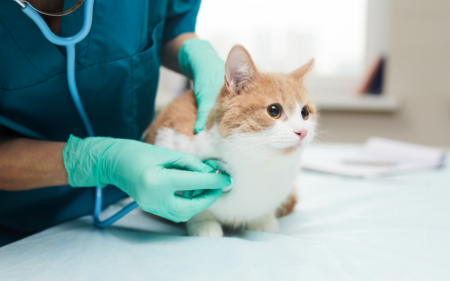
First Aid and Common Worries
Blood in Faeces – If you find that your dog or cat has blood in their faeces, try to determine whether it is fresh blood (red) or digested blood (black). This will help identify where it is coming from. If possible get a sample and bring it to us to test /identify. A very small amount of fresh blood may be due to your pet straining to pass faeces. Observe them over a short period to determine whether it occurs more than once. Blood in faeces is abnormal so it is advised to get them seen by a vet here at the clinic.
Seizures
Seizures (fits) can be caused by a number of factors and are traumatic to see if you have never witnessed one before. If your pet is a diagnosed epileptic, or has a history of seizures you may have some rectal medication that you can give to help stop the fit. If not you should contact us immediately for advice but do not try to restrain your pet – you may get bitten or scratched. If possible remove any objects that your pet may knock themselves on whilst fitting to limit any injury.
Road Traffic Accident
If your pet is sadly involved in a road traffic accident (RTA) then there is only one course of action. Phone us immediately (or the nearest veterinary clinic if away from home) and make an emergency appointment straight away. Try to move your pet as little as possible whilst in transit in case there are any broken bones.
Cut Foot / Pad
It is not unheard of for your pet to cut themselves when out and about on a walk etc. Sometimes they will bleed heavily in which case you should apply pressure to the area to prevent excess blood loss and phone us for an emergency appointment. If it is a minor injury it is likely to still require an appointment for a dressing as feet are notoriously difficult to heal without assistance.
Vomiting and Diarrhoea
Vomiting and diarrhoea can cause dehydration and loss of important salts /potassium etc. Severe bouts of either may make your pet feel extremely unwell. It is important to not let this go untreated for more than 24hrs and do not starve your pet for any longer than this. It may be caused by a bacterial infection (gastro‐enteritis) or it may be due to a metabolic illness within the body. The young and very old pets are more likely to suffer from dehydration than an adult, however no matter the age it is best to get them treated sooner rather than later. If they continue to vomit after 24hrs they may need medication / treatment. Remember that cats may bring up hairballs so check first.
Blood in Urine
It is highly recommended for us to examine your pet as soon as possible if you notice that they have blood in their urine. This can be caused by a number of reasons ranging from trauma to bladder stones and blockages. If an animal struggles to urinate it can impact on their kidney function if left untreated, so if you see any straining or passing of blood phone us immediately for an appointment.
Lump Found
It is important to run your hands over your pet regularly to familiarise yourself with what is normal for your pet and what is abnormal. If you locate a lump(mass) on your pet, it is advisable to get it looked at by a vet and they can advise you as to the best course of action. This may be removal, draining or medication. It is not advisable to assume that it is not a potential problem.
Worms
It is very important to ensure a suitable worming regime is in place if you have a new puppy and kitten as they will be affected by a worm burden quicker than an older animal. It is important to treat for both roundworm and tapeworm. If you notice that your cat or dog is not overweight but has a ‘pot‐bellied’ appearance then it may be due to a worm burden. Similarly if you notice ‘ricelike’ segments around your pet’s bottom then this indicates a tapeworm burden. (These segments carry the eggs of the tapeworm) Remember that just because you do not see any evidence around the bottom of your pet does not mean they do not have worms. A heavy burden can cause weight loss despite an increasing appetite but if you are unsure it is better to bring your pet for an appointment as these clinical signs may be confused for those of other conditions.


